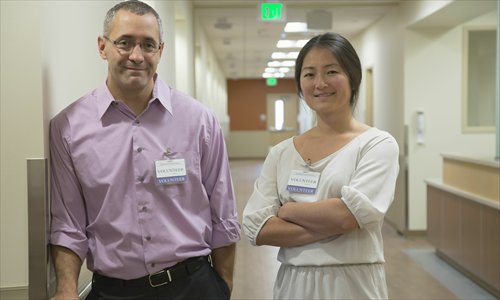What does work experience in China bring to expat doctors?

Expat doctors learn a lot from working in China, including traditional Chinese medicine and communication with patients. Photo: IC
After 10 years of practicing family medicine in Beijing, Richard Saint Cyr is leaving, but he is already deeply influenced by practicing medicine with Chinese characteristics.
As a US board-certified family medicine doctor working in Beijing, Saint Cyr appreciates how each culture practices medicine and approaches wellness in different ways.
In order to challenge himself and step out of his comfort zone, Saint Cyr came to China with his newlywed wife. When he first arrived, he was nervous.
According to him, he could have continued to live in Sonoma County in California for decades, practicing at the same family medicine clinic in the redwoods and driving to his hillside home in the vineyards.
"I could be sipping my own wine and munching on home-grown organic arugula salad in the pollution-free air," said Saint Cyr.
"If I had stayed, then I never would have experienced all of the cultures and ways of approaching health and medicine. Nor would I probably have become a New York Times health columnist, an oft-quoted pollution expert, or have a health book published in Chinese."
For many expat doctors like Saint Cyr, although they are sometimes challenged by different medication culture and working environment, working in a hospital in China has still enlightened them with Chinese medical gems and even changed the way they treat patients.

Some expat doctors are nervous about the tense doctor-patient relationship and the harsh environment in China. Photo: IC
Chinese gems
Working in China gives some expat doctors a peek into Chinese traditional gems - traditional Chinese medicine and the traditional concept yin and yang.
Saint Cyr was amazed by the curative effect of pipagao (loquat leaf extract) for the common cold. He never discovered this treatment when he was in the US.
"For a common cold, Western allopathic medicine offers nothing effective, but many Chinese use quite a bit of herbal medicines for colds and flu," Saint Cyr said.
"My favorite cough syrup for children and adults now is the famous herbal mixture pipagao, which I find more effective, with far fewer side effects than any Western over-the-counter cough syrups."
Alan Martin, a French doctor based in Beijing, is also a beneficiary of traditional Chinese medicine.
According to him, Qizhendan, particles used to treat a cold, fever and constipation, has a magical effect on kids.
"Once my 5-year-old son had a fever, cold and constipation, and I let him take the medicine for the very first time. Two hours later, he was able to use the bathroom and the fever was gone," said Martin. "I heard of the medicine from a patient. Sometimes I feel like my patients are teaching me as much as I am teaching them. I would definitely introduce this to my colleagues back in Paris."
The concept of yin and yang also enlightens expat doctors. The idea of balance, what some refer to as yin and yang, is one of the core tenets of Eastern philosophy. Saint Cyr has met many patients from China who believe that their illnesses are caused by an "imbalance" of heat, wind, etc.
"It's very different from Western philosophy and practice of medicine, but I think the closest is the concept of mind-body medicine, an idea that a healthy mind leads to a healthy body," Saint Cyr said.
According to him, the balance between yin and yang is similar to the interactions between mind and body that says emotional, mental and social factors can directly affect health. "The underlying concept that we need to keep our lives in balance is the same in the East and the West," he said.
Saint Cyr will move back to the US to work in a small clinic soon.
"I think as a doctor, I have a much more holistic approach to patients than I did before coming to China. I now incorporate a lot more mind-body and mindfulness in my practice," Saint Cyr said.
Treating patients
Working in a hospital in China offers the experience to encounter local patients and learn about communication.
According to Saint Cyr, working in China makes him much more sensitive to a patient's cultural background, which is a major factor in how they approach their own illnesses and treatments.
Compared with their Western counterparts, Chinese patients have different expectation concerning the use of medication and infusion since they grew up in a culture that believes in antibiotics and infusion.
Saint Cyr said he frequently sees local patients who are sick with the common cold symptoms of runny nose and cough but expecting antibiotics and an intravenous (IV) needle to treat this condition, even though those medicines are used to treat bacterial infections and do not help against this virus.
"Even after I explained to them that they only had a virus, they were quite flustered and still asked for antibiotics, telling me 'you are very different from a [doctor in a] local hospital.'"
Martin shares similar experiences. According to him, Chinese people have a high expectation for a prescription, even when they clearly do not need it.
"Once, I had an [8-something-year-old] patient who had diarrhea because of poor digestion. Medication was not needed, but his mother could not understand why I did not prescribe any drugs," he said.
For many local patients who come from a cultural background where the power of prescription and infusion is rooted, communication concerning an objective understanding of the two is important, Martin concluded.
"From working in China and meeting many local patients who hold very different opinions from me, I have gradually learned how to communicate and clear up doubt and confusion in a very patient way," said Martin. He added that pure theories do not work in convincing most local patients, he then would pull examples from real life, such as a patient with similar symptoms did not take any medication and still recovered.
"If I cannot persuade them the first time, I try a second and third time," Martin said.
Carlo Russo, an Italian pediatrician who had worked in Beijing for three years, said that the tense doctor-patient relationship is one of the driving forces to make him more patient in treating patients.
"Seeing how easily and unpredictably a conflict between doctors and patients could happen, a patient's anger could be triggered and a doctor could be beaten up. I began to feel a little nostalgic," Russo said.
Just as he arrived and started working in China, his colleague was punched in the face just because a patient experienced normal postoperative pain. He could not believe it actually happened since normal postoperative pain is not the doctor's fault at all. Similar events happened frequently, and Russo began to understand the tense and fragile doctor-patient relationship in China.
"Back in Italy, the relationship between doctors and patients was rarely as tense. I sometimes miss my previous working environment where the atmosphere was much lighter," he said.
A deeper understanding
Work experience in a hospital in China also makes expat doctors develop a deeper understanding concerning the national healthcare system in China.
Russo said that working in the hospital in China makes him more concerned about struggles in its healthcare system and makes him think about what can be done to improve the situation.
He said that back in Italy, he knew little about what happens in hospitals in China. "I was absolutely an outsider. Now, I feel more like an insider."
Russo believed that the establishment of outpatient clinics in communities should be given more consideration because they help with the pressure of large number of patients in the big local hospitals.
Saint Cyr is one who had tried to fix what he saw as a weak point in the healthcare system in China. He said he took into account all the struggles in the enormous healthcare system in China, especially not having a strong primary care system with family doctors such as himself.
Saint Cyr had helped educate people in China about primary care and train the first generation of board-certified family doctors here in the fellowship program at Beijing United Family Hospital.
Saint Cyr is known to many people in China due to his blogs on health and wellness in China and the popular testing of the effectiveness of masks produced by different manufacturers to combat Beijing's notorious smog. "I never set out to be 'influential' here in China, I just happened to start my health blog at the right time," said Saint Cyr.
He added that working in China sometimes entails working in a harsh environment where the air is dirty, the foods may contain suspicious additive and the water may be undrinkable, but at the same time, it pushes him to study, research and develop his understanding of wellness under such circumstances.
"It has been an amazing opportunity to meet so many inspiring people I never would have seen, both in my clinics and from my writings and interactions with my readers," said Saint Cyr. "The final tally, for me, is very much a net positive."
Newspaper headline: Paging doctor West